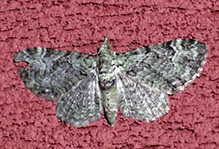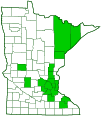green pug
(Pasiphila rectangulata)
Conservation • Description • Habitat • Ecology • Distribution • Taxonomy
|
||||||||
| Hodges # | 7625 |
|||||||
Conservation Status |
||||||||
| IUCN Red List | not listed |
|||||||
| NatureServe | NNA - Not applicable |
|||||||
| Minnesota | not listed |
|||||||
Description |
||
Green pug is an exotic, small, broad-winged moth. It is native to Europe and Asia. It was introduced into North America in the 1970s. It was first detected in British Columbia in 1973, and it has since spread to other parts of the Pacific Northwest, eastern Canada, and the northeastern United States. The exact method of introduction is unknown, but it is thought to have been accidentally brought over on nursery stock or other plant material. In the U.S., it now occurs in the east from Maine to Virginia, west to Minnesota and Illinois, and in the west from northwestern Washington to west-central California. It is not uncommon in Minnesota. Adults are active in June and July. In their native regions, and probably also in North America, they are found in woodland edges, shrubby areas, hedgerows, orchards, parks, and gardens. The larvae feed on the flowers of fruit trees, including apple, cherry, hawthorn, pear, and serviceberry. The moth has not been found to cause any significant economic or ecological damage in North America. Adults have a ⅝″ to ⅞″ (17 to 23 mm) wingspan. The forewings are broad. The coloration is highly variable. The background color on freshly emerged adults is usually green, but the green color quickly fades. On mature adults they may be light brown, grayish-brown, or sometimes gray, but they are always heavily marked with black or blackish-brown lines, patches, and shading. The antemedial (AM) and postmedial (PM) lines are dark and wavy. The subterminal (ST) line is represented by a pale crescent-shaped mark between each vein. There are two black patches near the wingtip. The hindwings are similarly colored. The lines on the forewings continue across the hindwings. The abdomen is colored like the wings, and it has a broad, dark, transverse band near the base. |
||
Size |
||
Wingspan: ⅝″ to ⅞″ (17 to 23 mm) |
||
Similar Species |
||
Habitat |
||
Woodland edges, shrubby areas, hedgerows, orchards, parks, and gardens |
||
Ecology |
||
Season |
||
June and July |
||
Behavior |
||
Adults are active at night and will come to lights. They rest with their wings spread out flat against tree trunks and branches. |
||
Life Cycle |
||
Eggs overwinter |
||
Larva Food |
||
Flowers of fruit trees, including apple, cherry, hawthorn, pear, and serviceberry |
||
Adult Food |
||
Flower nectar |
||
Distribution |
||||
|
Sources |
|||
| 12/2/2023 | ||||
Occurrence |
||||
Common |
||||
Taxonomy |
|||
Order |
Lepidoptera (Butterflies and Moths) | ||
Superfamily |
Geometroidea (Geometrid and Swallowtail Moths) | ||
Family |
Geometridae (Geometer Moths) | ||
Subfamily |
Larentiinae (carpet moths) | ||
Tribe |
Eupitheciini (pug moths and allies) | ||
Genus |
Pasiphila | ||
Synonyms |
|||
Chloroclystis rectangulata Eupithecia griseata Eupithecia rectangularia Geometra bischoffaria Geometra subaerata Hubner Phalaena nigrosericeata Phalaena rectangulata Phalaena sericeata Phalaena viridulata Pyralis mediana Rhinoprora rectangulata |
|||
Common Names |
|||
green pug |
|||
Glossary
Antemedial (AM) line
A thin line separating the basal area and the median area of the forewing of Lepidoptera.
Postmedial (PM) line
A thin line separating the median area and the postmedial area of the forewing of Lepidoptera.
Visitor Photos |
|||||
Share your photo of this insect. |
|||||
| This button not working for you? Simply email us at info@MinnesotaSeasons.com. Attach one or more photos and, if you like, a caption. |
|||||
Babette Kis |
|||||
Pasiphila rectangulata (green pug) Green pug, on house next to Barnes Prairie, Racine Co., WI. Photographed on June 24, 2020. |
 |
||||
MinnesotaSeasons.com Photos |
|||||
|
|||||

Slideshows |
||

Visitor Videos |
|||
Share your video of this insect. |
|||
| This button not working for you? Simply email us at info@MinnesotaSeasons.com. Attach a video, a YouTube link, or a cloud storage link. |
|||
Other Videos |
|||
| Groene dwergspanner - Pasiphila rectangulata Het Wildepad |
|||
About
Jun 11, 2023 Google Translate: National Measuring Program for Moths - 10-06-2023 The green dwarf moth (Pasiphila rectangulata, synonym Rhinoprora rectangulata, formerly also Chloroclystis rectangulata) is a moth from the moth family. With a wingspan of 15 to 20 millimeters, the butterfly is one of the smaller species in this family. The caterpillars feed on the blossoms of fruit trees such as apple and pear. The flying period runs from May to August. The species has declined due to intensive use of pesticides on fruit trees. |
|||


Created: 12/2/2023
Last Updated:

